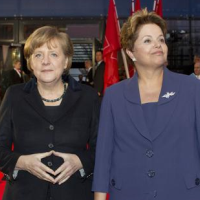U.N. Privacy Resolution Proceeds after Dilution by U.S. and “Five Eyes” Allies
 German Chancellor Angela Merkel and Brazil's President Dilma Rousseff (AP photo)
German Chancellor Angela Merkel and Brazil's President Dilma Rousseff (AP photo)
The United Nations is close to adopting a resolution that calls for the end of excessive government surveillance and reaffirms the “human right to privacy.”
The resolution was introduced by representatives of Germany and Brazil, following revelations of National Security Agency (NSA) spying on those countries, as well as on the phone calls of their two leaders, respectively, Chancellor Angela Merkel and President Dilma Rousseff.
The resolution was amended under pressure from U.S. officials.
“The right to privacy in the digital age” resolution does not single out specific countries, but is believed to be directed at the U.S.
It states the UN is: “Deeply concerned at the negative impact that surveillance and/or interception of communications … may have on the exercise and enjoyment of human rights.”
The resolution adds that “unlawful or arbitrary” surveillance may “contradict the tenets of a democratic society,” and that states “must ensure full compliance with their obligations under international human rights law.”
The draft document “establishes for the first time that human rights should prevail irrespective of the medium, and therefore need to be protected online and offline,” said Brazil's Ambassador Antonio de Aguiar Patriota. “In the absence of the right to privacy, there can be no true freedom of opinion and expression, and no effective democracy.”
Fifty-five countries co-sponsored the resolution, including Russia, North Korea and France. The U.S. did not vote against the measure, but did lobby its “Five-Eyes” intelligence sharing alliance members (the United Kingdom, Canada, Australia and New Zealand) to water down the language of the resolution.
The diluted text involved the weakening of a statement which had said that the interception and collection of communications and personal data—“in particular massive surveillance”— whether done domestically or internationally, may constitute a human rights violation.
Another key point of contention was language that said foreign nationals should have the same privacy rights as citizens of countries that are carrying out mass surveillance. The Five-Eyes governments argued that the right to privacy was an internal matter for each nation to decide upon.
The UN General Assembly is expected to vote on the non-binding resolution next month.
If the measure is adopted, the UN’s human rights commissioner will launch an inquiry into the impact of mass digital surveillance.
The American Civil Liberties Union was critical of the U.S. role in the resolution process, given what we now know about the NSA’s operations. “Yet again, the U.S. is paying lip service to human rights when it comes to holding intelligence services accountable overseas,” ACLU human rights program director Jamil Dakwar said in a statement quoted by the Associated Press. “It is regrettable that the U.S. is investing time to circumvent the universal human right to privacy rather than setting a new course by ending dragnet surveillance.”
-Danny Biederman, Noel Brinkerhoff
To Learn More:
UN Advances Surveillance Resolution Reaffirming 'Human Right to Privacy' (by Dominic Rushe, The Guardian)
UN Gives Green Light to Internet Privacy Resolution (RT)
UN Advances Internet Privacy Resolution (by Peter James Spielmann, Associated Press)
NSA Gone Wild: Spying on UN, European Union and 80 Embassies Worldwide (by Noel Brinkerhoff, AllGov)
Has the NSA ever Used its Surveillance Powers for Purposes other than Combating Terrorism? You Bet (by Noel Brinkerhoff, AllGov)
- Top Stories
- Unusual News
- Where is the Money Going?
- Controversies
- U.S. and the World
- Appointments and Resignations
- Latest News
- Trump Orders ICE and Border Patrol to Kill More Protestors
- Trump Renames National Football League National Trump League
- Trump to Stop Deportations If…
- Trump Denounces World Series
- What If China Invaded the United States?






Comments